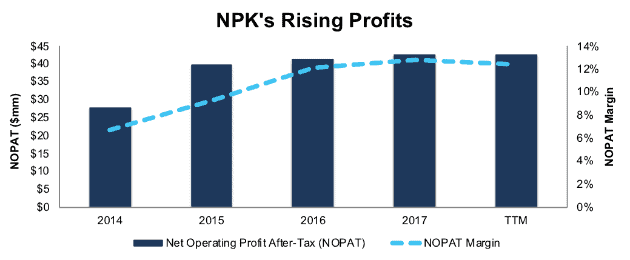Three new stocks make our Safest Dividend Yield Model Portfolio this month, which was made available to members on October 24, 2018.
Recap from September’s Picks
The best performing small cap stock was up 2%. Overall, 12 out of the 20 Safest Dividend Yield stocks outperformed the S&P in September.
This Model Portfolio leverages our Robo-Analyst technology[1], which scales our forensic accounting expertise (featured in Barron’s) across thousands of stocks.[2]
This Model Portfolio only includes stocks that earn an Attractive or Very Attractive rating, have positive free cash flow and economic earnings, and offer a dividend yield greater than 3%. Companies with strong free cash flow provide higher quality and safer dividend yields because we know they have the cash to support the dividend. We think this portfolio provides a uniquely well-screened group of stocks that can help clients outperform.
Featured Stock for October: National Presto Industries (NPK: $126/share)
National Presto Industries (NPK), is the featured stock in October’s Safest Dividend Yields Model Portfolio. NPK was also featured as a Long Idea in June 2018.
Since 2014, NPK has grown after-tax operating profit (NOPAT) by 16% compounded annually. NOPAT margin has increased from 7% in 2014 to 12% TTM while return on invested capital (ROIC) has improved from 9% to a top-quintile 19% over the same time.
Figure 1: NPK NOPAT and Margin Since 2014
Sources: New Constructs, LLC and company filings
NPK’s Free Cash Flow Supports Dividend Payments
NPK pays a regular dividend of $1/share and recently paid a special cash dividend of $5/share, which combines for a total dividend yield of 4.8%. While special dividends are by definition non-recurring, NPK has paid one in each of the past four years. This dividend payment (regular and special) has been supported by NPK’s strong free cash flow. Since 2013, NPK has generated a cumulative $185 million (21% of market cap) in FCF while paying $179 million in dividends.
Companies with strong free cash flow provide higher quality dividend yields because we know the firm has the cash to support its dividend. On the flip side, dividends from companies with low or negative free cash flow cannot be trusted as much because the company may not be able to sustain paying dividends.
Valuation Implies Little Future Profit Growth
Even after outperforming the market since our article (up 10% vs. S&P 500 down 2%), NPK remains undervalued. At its current price of $126/share, NPK has a price-to-economic book value (PEBV) ratio of 1.1, which implies that the market expects NOPAT to grow by no more than 10% over the remaining life of the corporation.
This pessimistic expectation is unwarranted, especially when one considers NPK’s recent NOPAT growth and the significant tax cut NPK is set to receive. If NPK can reduce its cash tax rate to the new statutory rate of 21% (from 33%) it can generate 18% more NOPAT and increase its NOPAT margin from 12% to 15%.
As we noted in our Long Idea, we think NPK would be better off selling its Housewares segment, but even if the company keeps the businesses together, it should still be able to exceed the low expectations implied by its stock price.
Even if we project a decline in Housewares to be a drag on NPK’s pre-tax margin and revenue growth, the stock still has significant long-term value. If pre-tax margins for the company fall from 19% in 2017 to 18%, and revenue grows by 3% compounded annually for the next decade, the stock is worth $155/share, a 23% upside. See the math behind this dynamic DCF scenario.
Critical Details Found in Financial Filings by Our Robo-Analyst Technology
As investors focus more on fundamental research, research automation technology is needed to analyze all the critical financial details in financial filings. Below are specifics on the adjustments we make based on Robo-Analyst findings in National Presto Industries’ 2017 10-K:
Income Statement: we made $16 million of adjustments, with a net effect of removing $10 million in non-operating expense (3% of revenue). You can see all the adjustments made to NPK’s income statement here.
Balance Sheet: we made $175 million of adjustments to calculate invested capital with a net decrease of $132 million. The largest adjustment was $149 million (41% of net assets) in excess cash. See all adjustments to NPK’s balance sheet here.
Valuation: we made $150 million of adjustments with a net effect of increasing shareholder value by $149 million. Apart from the excess cash noted above, the largest adjustment to shareholder value was $1 million from off-balance sheet operating leases. This adjustment represents less than 1% of NPK’s market value.
This article originally published on November 1, 2018.
Disclosure: David Trainer, Kyle Guske II, and Sam McBride receive no compensation to write about any specific stock, style, or theme.
Follow us on Twitter, Facebook, LinkedIn, and StockTwits for real-time alerts on all our research.
[1] Harvard Business School features the powerful impact of our research automation technology in the case New Constructs: Disrupting Fundamental Analysis with Robo-Analysts.
[2] Ernst & Young’s recent white paper “Getting ROIC Right” proves the superiority of our holdings research and analytics.

